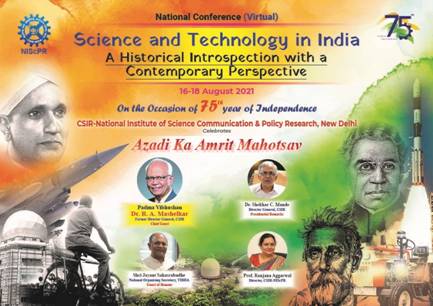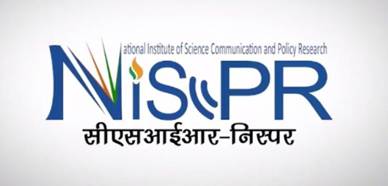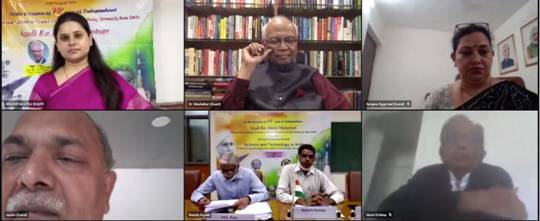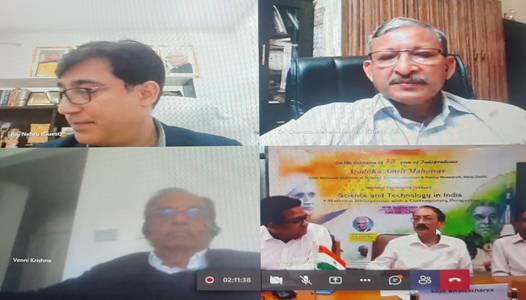National Institute of Science Communication and Policy Research (NIScPR) of the Council of Scientific & Industrial research (CSIR) is organizing three days National Conference (virtual) to commemorate “AzadiKaAmritMahotsav”.
Today, 16th August, 2021 was the first day of the conference. In the inaugural session, Prof.Ranjana Aggarwal, Director CSIR-NIScPR, New Delhi welcomed all the dignitaries and audience. In her welcome address she welcomed all eminent dignitaries and participants of the conference. While explaining about the significance of the conference, she said that to study the historical perspective of science is very important. She further added that study of historical perspective is important because we need to learn from our past. The factors like S&T in India, growth in infrastructure, new education policy of India and all such issues in historical perspective is essential to march ahead and work according to the dream of Hon’ble Prime Minister of India Mr Narendra Modi. All this is in alliance with Hon’ble PM’s call for AzadikaAmrutMahotsav. She ended by saying that in this three-day conference a roadmap will be planned for betterment of the country.

Immediately after NIScPR Director’s address, the logo of the newly formed institution NIScPR was released by Padma Vibhushan Dr. R.A. Mashelkar in the gracious presence of Dr.Shekhar C. Mande and Shri Jayant Sahasrabudhe.

The logo of CSIR-NIScPR released by Dr.Mashelkar
Shri Jayant Sahasrabudhe, National Organising Secretary of VijnanaBharati spoke as the Guest of Honour in the inaugural session. In his lecture, Shri Sahasrabudhe said that for the study of S&T in India, its historical review and introspection is important. Indian scientists like Acharya J.C. Bose, Dr.Ashutosh Mukherjee, Acharya Prafulla Chandra Roy, Shri S.N. Bose, Sir ChandrasekharaVenkata Raman, and Dr.MeghnadSaha worked tirelessly to strengthen the uplift the scientific status of India. Theircontributionsgave us the strong platform to the development of Science and Technology in India. He further added that with the self-confidence of the Indian scientists, Indian science got international acceptance and recognition. He further said that we should understand the confidence of our scientists and try to make the country self-reliant and make ourselves self-confident. He concluded his speech by saying that these three days of this conference will help in development of self-confidence and self-reliance among students and scientists of India.

Inaugural Session: Dr.Mashelkar is in the middle of the top row, Prof.Ranjana Aggarwal is at the extreme right in top row and Shri Jayant Sahasrabudhe is at extreme left in bottom row.
Chief Guest of the inaugural sessionPadma Vibhushan Dr. R.A. Mashelkargave a though provoking lecture on the topic “Indian Science and CSIR looking back and looking ahead.” He began by saying that we should aspire to make self-confident and self-reliant India. He enlightened the audience about the top 10 achievements of 20th century. He expressed his views for a New CSIR for New India by being aspirational, resilient, inclusive, assured and ever leading in every front. Dr.Mashelkar told that India has emerged as a global R&D platform with hundreds of R&D centres, thousands of scientists and engineers. He also congratulated CSIR for showing amazing adaptability and agility in mitigating SARS-Cov-2 pandemic. During the pandemic time, CSIR has galvanized its different work to provide support to the public at large.
Dr.Shekhar C. Mande, Director General CSIR & Secretary, DSIR, Govt. of India presided over the inaugural session. He thanked Dr.Mashelkarand Shri Jayant Sahasrabudhe. He told that CSIR has started responding the problems of national importance with much required agility and swiftness. Yesterday after PM’s Independence Day lecture, he organised a meeting with CSIR lab directors to discuss on hydrogen initiative as pointed out by Hon’ble PM of India.
Dr. Mohammad Rais, Chief Scientist, CSIR-NIScPR gave introductions of the dignitaries and Dr. Naresh Kumar, Chief Scientist, CSIR-NIScPR proposed vote of thanks. He thanked all the dignitaries and audience of the inaugural session for contributing their time.
The first session of the national conference was focused on “Building the Infrastructure of Science: Learning from the Past”. Chair of the session Shri Raj Nehru, Vice Chancellor, Shri Vishwakarma Skill University, Haryana initiated the discussion by remembering the achievements of ancient India in the domain of science, technology and innovation. He wished to integrate the skills and the past learning process with the modern scientific world by taking a multi-disciplinary approach. Co-chair of the session, Dr.Sujit Bhattacharya, Chief Scientist, CSIR-NISTADS enlightened the audience about the theme of the session.
Prof. V.V. Krishna, Professor Fellow, University of New South Wales, Sydney, Australia shared his views on the historical roots and contemporary landscape of inclusive innovation. He discussed the initiatives taken up by Gandhi and Tagore which helped in decentralization of small industries in the Indian villages that became one of the catalysts of industrialization in India. Dr. Krishna also discussed the white revolution and included the example of how Amul has led to inclusive innovation.
Dr. Chandra Mohan Nautiyal, former Scientist, BSIP, Lucknow and Consultant (Science Communication), INSA, New Delhi delivered his lecture on the promotion of infrastructure for experimental research. He discussed the revolution of post-independence science through the reforms of scientific institutions to promote higher education and science and technology in India. He shared a few major schemes for the R&D support to researchers that are fulfilling the goals of Atmanirbhar Bharat.

Speakers of the first session of the conference
The theme of second session of the conference was “Important Transitions in Indian STI: The Last 100 Year”. Prof. P.K. Joshi of HomiBhabha Centre for Science Education (TIFR), Mumbai chaired the session. Dr.Akhilesh Gupta, Senior Advisor of the Department of Science & Technology, Govt. of India delivered his talk on “Science, Technology and Innovation in India: Progress and Vision for 2030”. He emphasized that the S&T research budget should be enhanced and the open access policy to be reinforced in the National Data Sharing policy. He focused on the need of alignment of New education Policy with the Science, Technology and Innovation Policy.
Dr. Ashok Jain, former Director, CSIR-NISTADS was speaking on the changing science technology society configurations in India. He said that India needs science for social and economic benefits. We are the only country in the world that has included the development of science temper in the Constitution and later that became the part of the organized sector.
Audience asked presented a number of queries and questions which were responded by the experts of the conference. Dr.Meher Wan, Scientist, CSIR-NIScPR and Shri Manoj Varghese, Research scholar of AcSIR were the anchors of the first and second sessions of the conference.
<><><><><>
SNC/TM/RR

